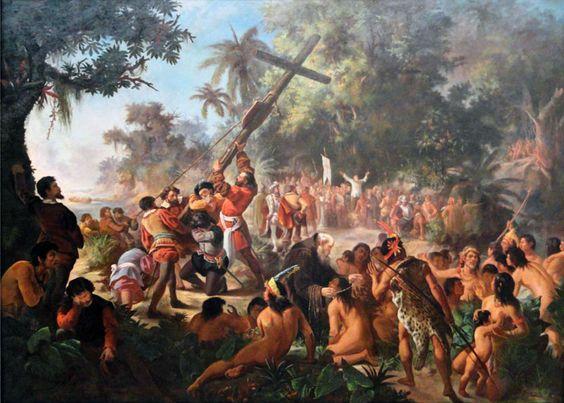By Maria Gkika,
In America, a very controversial national holiday is celebrated every October. Whether called Columbus Day, Day of the Race or “Hispanicity Day”, it is a definite anniversary of an enormous event that changed the course of human history and affects us even today. October 12th 1492 was the day that Christopher Columbus arrived with his crew in the land that we call today America. Sponsored by the queen of Spain, Isabella I of Castile, he was tasked to find an easier sea route to Far East but instead, ended up discovering the “New World” by arriving on a small island in today’s Bahamas.

The celebration of this date faces a lot of controversies. On the one hand, Columbus’ discovery and the subsequent colonization provided Spain (and later other European countries) with new land, allowing them to develop socioeconomically and learn a lot from the indigenous people in the area. For these reasons, and considering that history is written by the winners, for many centuries now this day has been a joyous occasion for the Americans who celebrate the discovery of the land. On the other hand, this day marked the beginning of the genocide of the native population by the Europeans, caused either by violence or diseases. The conquerors thought the indigenous were savages and inferior to them. However, in reality, they have created very organised systems of society. They were also pioneers in art, architecture and science. The Europeans enslaved the indigenous people and forced them to abandon their customs and way of life and conform to the practices of their captors. Indigenous culture was destroyed and their legacy was almost at the point of extinction.
“In 1492, the natives discovered that they were Indians, they discovered that they lived in America, they discovered that they were naked, they discovered that sin existed, they discovered that they owed obedience to a king and queen from another world and to a god from another heaven, and that that god had invented guilt and clothing and had ordered that anyone who worshipped the sun and the moon and the earth and the rain that wets it be burned alive”. – Eduardo Galeano
While the cruelty of colonizers was concealed by historical references portraying them as explorers and saviors, today there is a rising awareness regarding the natives’ suffering. There are many efforts to preserve their memory and culture, even as racism continues to thrive. Thus, the celebration of Columbus Day in the United States began to decline at the end of the 20th century, although many Americans continue to celebrate it. It is telling that this year in Venezuela the holiday was changed to “Día de la Resistencia Indígena” (Day of Indigenous Resistance to commemorate the Indigenous peoples’ resistance to European settlement).

To conclude, aside from the controversies and disagreements around the topic, the celebration of this day should be an opportunity for reflection. It should also be a reminder to respect and cherish the cultural heritage of the indigenous people. However, it is also imperative to consider the influence of modern society on culture and human rights. What do the subjects of oppression, freedom and conformity mean for us? What restrictions are we facing in the effort to conform to today’s dominant sociocultural standards? How can we understand ourselves and our real needs in order to live better? Influence is a given in life and in social identities, just as it is in art. Still, it is the matter of setting our own boundaries that can determine our development as personalities and thus the creation of more culturally acceptant societies.
References
- Columbus Day and its discontents. britannica.com. Available here
- Eduardo Galeano quotes. azquotes.com. Available here




